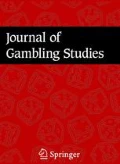Abstract
Participants in randomized control trials (RCTs) should be representative of those most likely to experience the disorder of focus, yet reviews of psychology research studies consistently find certain demographic groups are overrepresented at the price of others being unincluded. The present review aimed to characterize the demographic representation of US-based RCTs for gambling disorder and compare findings to the population of individuals most likely to experience the disorder. Thirteen US-based RCTs comprising a total of 2,343 participants were reviewed. We found that although gambling disorder is most prevalent among low SES racial minorities, RCTs are mostly conducted among populations who are white, employed, and have some level of college education. Demographic variables that are related to the likelihood of experiencing gambling disorder are not consistently reported, and there are many groups of individuals who experience gambling disorder that have been virtually left out of all treatment study samples to date. We conclude with recommendations for future gambling focused treatment studies, which are geared towards increasing the convergence between characteristics of participants in RCTs and those who experience gambling disorder in the United States.

Similar content being viewed by others
References
American Psychological Association. (2012). Guidelines for psychological practice with lesbian, gay, and bisexual clients. The American Psychologist, 67(1), 10–42. https://doi.org/10.1037/a0024659
Barnes, G. M., Welte, J. W., & Tidwell, M. C. O. (2017). Gambling involvement among Native Americans, blacks, and whites in the United States. The American Journal on Addictions, 26(7), 713–721.
Cuijpers, P. (2017). Four decades of outcome research on psychotherapies for adult depression: An overview of a series of meta-analyses. Canadian Psychology/Psychologie Canadienne, 58(1), 7–19.
Goslar, M., Leibetseder, M., Muench, H. M., Hofmann, S. G., & Laireiter, A. R. (2017). Efficacy of face-to-face versus self-guided treatments for disordered gambling: A meta-analysis. Journal of Behavioral Addictions, 6(2), 142–162.
Henrich, J., Heine, S. J., & Norenzayan, A. (2010). Most people are not WEIRD. Nature, 466(7302), 29–29.
Huffman, L. E., Wilson, D. K., Kitzman-Ulrich, H., Lyerly, J. E., Gause, H. M., & Resnicow, K. (2016). Associations between culturally relevant recruitment strategies and participant interest, enrollment and generalizability in a weight-loss intervention for African American families. Ethnicity & Disease, 26(3), 295.
McNeilly, D. P., & Burke, W. J. (2000). Late life gambling: The attitudes and behaviors of older adults. Journal of Gambling Studies, 16(4), 393–415.
Miranda, J., Nakamura, R., & Bernal, G. (2003). Including ethnic minorities in mental health intervention research: A practical approach to a long-standing problem. Culture, Medicine and Psychiatry, 27(4), 467–486.
National Institutes of Health (NIH). (2019). Inclusion of women and minorities as participants in research involving human subjects. NIH Central Resource for Grants and Funding Information. https://grants.nih.gov/policy/inclusion/women-and-minorities.htm
NIH Guidelines on the Inclusion of Women and Minorities as Subjects in Clinical Research (1994). Federal register, Part VIII (59 FR 14508–14513), March 28.
Nowak, D. E., & Aloe, A. M. (2014). The prevalence of pathological gambling among college students: A meta-analytic synthesis, 2005–2013. Journal of Gambling Studies, 30(4), 819–843.
Peter, S. C., Brett, E. I., Suda, M. T., Leavens, E. L. S., Miller, M. B., Leffingwell, T. R., Whelan, J. P., & Meyers, A. W. (2019). A meta-analysis of brief personalized feedback interventions for problematic gambling. Journal of Gambling Studies, 35(2), 447–464.
Petry, N. M., Ginley, M. K., & Rash, C. J. (2017). A systematic review of treatments for problem gambling. Psychology of Addictive Behaviors, 31(8), 951–961.
Pfund, R. A., Peter, S. C., McAfee, N. W., Ginley, M. K., Whelan, J. P., & Meyers, A. W. (2021). Dropout from face-to-face, multi-session psychological treatments for problem and disordered gambling: A systematic review and meta-analysis. Psychology of Addictive Behaviors. https://doi.org/10.1037/adb0000710
Pfund, R. A., Peter, S. C., Whelan, J. P., Meyers, A. W., Ginley, M. K., & Relyea, G. (2020). Is more better? A meta-analysis of dose and efficacy in face-to-face psychological treatments for problem and disordered gambling. Psychology of Addictive Behaviors., 34(5), 557–568.
Polo, A. J., Makol, B. A., Castro, A. S., Colón-Quintana, N., Wagstaff, A. E., & Guo, S. (2019). Diversity in randomized clinical trials of depression: A 36-year review. Clinical Psychology Review, 67, 22–35.
Santiago, C. D., Kaltman, S., & Miranda, J. (2013). Poverty and mental health: How do low-income adults and children fare in psychotherapy? Journal of Clinical Psychology, 69(2), 115–126.
Smalley, K. B., Yancey, C. T., Warren, J. C., Naufel, K., Ryan, R., & Pugh, J. L. (2010). Rural mental health and psychological treatment: A review for practitioners. Journal of Clinical Psychology, 66(5), 479–489.
Welte, J. W., Barnes, G. M., Tidwell, M. C. O., Hoffman, J. H., & Wieczorek, W. F. (2015). Gambling and problem gambling in the United States: Changes between 1999 and 2013. Journal of Gambling Studies, 31(3), 695–715.
Systematic Review
Campos, M. D., Rosenthal, R. J., Chen, Q., Moghaddam, J., & Fong, T. W. (2016). A self-help manual for problem gamblers: The impact of minimal therapist guidance on outcome. International Journal of Mental Health and Addiction, 14(4), 579–596. https://doi.org/10.1007/s11469-015-9579-5
Grant, J. E., Donahue, C. B., Odlaug, B. L., Kim, S. W., Miller, M. J., & Petry, N. M. (2009). Imaginal desensitisation plus motivational interviewing for pathological gambling: Randomised controlled trial. The British Journal of Psychiatry : The Journal of Mental Science, 195(3), 266–267. https://doi.org/10.1192/bjp.bp.108.062414
Labrie, R. A., Peller, A. J., Laplante, D. A., Bernhard, B., Harper, A., Schrier, T., & Shaffer, H. J. (2012). A brief self-help toolkit intervention for gambling problems: A randomized multisite trial. The American Journal of Orthopsychiatry, 82(2), 278–289. https://doi.org/10.1111/j.1939-0025.2012.01157.x
Larimer, M. E., Neighbors, C., Lostutter, T. W., Whiteside, U., Cronce, J. M., Kaysen, D., & Walker, D. D. (2012). Brief motivational feedback and cognitive behavioral interventions for prevention of disordered gambling: A randomized clinical trial. Addiction, 107(6), 1148–1158. https://doi.org/10.1111/j.1360-0443.2011.03776.x
Marceaux, J. C., & Melville, C. L. (2011). Twelve-step facilitated versus mapping-enhanced cognitive-behavioral therapy for pathological gambling: A controlled study. Journal of Gambling Studies, 27(1), 171–190. https://doi.org/10.1007/s10899-010-9196-y
Martens, M. P., Arterberry, B. J., Takamatsu, S. K., Masters, J., & Dude, K. (2015). The efficacy of a personalized feedback-only intervention for at-risk college gamblers. Journal of Consulting and Clinical Psychology, 83(3), 494–499. https://doi.org/10.1037/a0038843
Melville, C. L., Davis, C. S., Matzenbacher, D. L., & Clayborne, J. (2004). Node-link-mapping-enhanced group treatment for pathological gambling. Addictive Behaviors, 29(1), 73–87. https://doi.org/10.1016/s0306-4603(03)00091-1
Neighbors, C., Rodriguez, L. M., Rinker, D. V., Gonzales, R. G., Agana, M., Tackett, J. L., & Foster, D. W. (2015). Efficacy of personalized normative feedback as a brief intervention for college student gambling: A randomized controlled trial. Journal of Consulting and Clinical Psychology, 83(3), 500–511. https://doi.org/10.1037/a0039125
Petry, N. M., Ammerman, Y., Bohl, J., Doersch, A., Gay, H., Kadden, R., Molina, C., & Steinberg, K. (2006). Cognitive-behavioral therapy for pathological gamblers. Journal of Consulting and Clinical Psychology, 74(3), 555–567. https://doi.org/10.1037/0022-006X.74.3.555
Petry, N. M., Rash, C. J., & Alessi, S. M. (2016). A randomized controlled trial of brief interventions for problem gambling in substance abuse treatment patients. Journal of Consulting and Clinical Psychology, 84(10), 874–886. https://doi.org/10.1037/ccp0000127
Petry, N. M., Weinstock, J., Ledgerwood, D. M., & Morasco, B. (2008). A randomized trial of brief interventions for problem and pathological gamblers. Journal of Consulting and Clinical Psychology, 76(2), 318–328. https://doi.org/10.1037/0022-006X.76.2.318
Petry, N. M., Weinstock, J., Morasco, B. J., & Ledgerwood, D. M. (2009). Brief motivational interventions for college student problem gamblers. Addiction, 104(9), 1569–1578. https://doi.org/10.1111/j.1360-0443.2009.02652.x
Rosen, L. A., Weinstock, J., & Peter, S. C. (2020). A randomized clinical trial exploring gambling attitudes, barriers to treatment, and efficacy of a brief motivational intervention among ex-offenders with disordered gambling. Journal of Forensic Sciences. https://doi.org/10.1111/1556-4029.14476
Funding
This work was supported by the National Institute of Alcoholism and Alcohol Abuse of the National Institutes of Health, award number T32AA018108. The content is the sole responsibility of the authors and does not necessarily represent the official views of the National Institutes of Health.
Author information
Authors and Affiliations
Corresponding author
Ethics declarations
Conflict of interest
The authors declare that they have no conflict of interest.
Ethical Approval
This article does not contain any studies with human participants performed by any of the authors.
Additional information
Publisher's Note
Springer Nature remains neutral with regard to jurisdictional claims in published maps and institutional affiliations.
Rights and permissions
About this article
Cite this article
Peter, S.C., Pfund, R.A. & Ginley, M.K. Increased Demographic Representation in Randomized Control Trials for Gambling Disorder in the United States is Needed: A Systematic Review. J Gambl Stud 37, 1025–1041 (2021). https://doi.org/10.1007/s10899-021-10055-w
Accepted:
Published:
Issue Date:
DOI: https://doi.org/10.1007/s10899-021-10055-w




